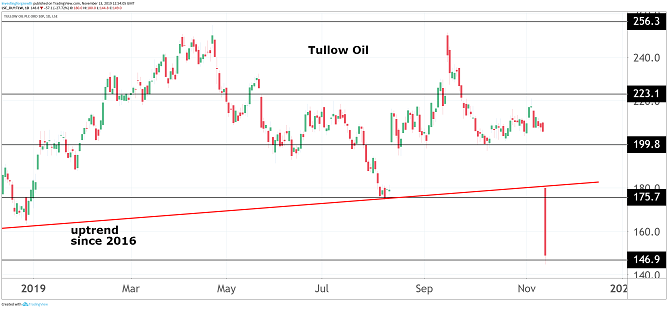Tullow Oil shares down 30%, Eco Atlantic down 50%. Why?
These oil exploration partners have come unstuck, but plenty think that the sell-off is overdone.
13th November 2019 13:01
by Graeme Evans from interactive investor
These oil exploration partners have come unstuck, but plenty think that the sell-off is overdone.

The highs and lows of oil and gas exploration were brought home to investors today after analysis of two discoveries in Guyana triggered hefty share price slides for Tullow Oil (LSE:TLW) and its joint venture partner, AIM-listed Eco (Atlantic) Oil & Gas (LSE:ECO).
The pair said initial samples suggest the Jethro-1 and Joe-1 wells contain heavy crude oil with high sulphur content, making them more challenging and less desirable than sweet crude.
More research will now take place to determine the potential for commercial production, while Eco and its partners continue the pursuit of other discoveries in the same area. Tullow, which has a 60% stake in the Orinduik block alongside 25% for French giant Total (EURONEXT:FP), said it remained confident of the light oil potential in this “prolific oil basin”.
Eco, which has a 15% stake, added that it was encouraged by the initial analysis, given that a great part of the conventional heavy oil challenge should be eliminated by the fact that the oil is already hot in the reservoir and mobile.
However, the early evidence of heavy crude still helped to wipe out all Eco's share price gains since its August announcement of a major oil discovery in offshore Guyana. Today's 50% slide to as low as 55p is particularly painful for chief executive Gil Holzman and non-executive director Peter Nicol after they each recently spent over £50,000 on buying shares with the price at more than 140p.

Source: TradingView Past performance is not a guide to future performance
There was also further disappointment for backers of Tullow Oil, whose shares dived 23% to 156p after a trading update in which it also cut production guidance for the second time since July. The expected 87,000 barrels of oil per day, compared with a range of 89,000 to 93,000 previously, is largely due to lower-than-expected output from Tullow's fields in offshore Ghana.
The combination of weaker production and lower second half oil prices means 2019 free cash flow will be down on forecasts at US$350 million, against the $411 million recorded for 2018. Even though debt reduction has continued, investors took the opportunity to step up a sell-off that began in September when shares were at 240p.
FTSE 250 index-listed Tullow has now lost all the share price gains achieved earlier this year, having rewarded shareholders in February with its first dividend in five years alongside a pledge to pay at least $100 million going forward.

Source: TradingView Past performance is not a guide to future performance
Davy analyst Job Langbroek said the statement would make "disheartening reading for shareholders", particularly as it clouds progress for Tullow in Kenya after the export of East Africa's first cargo of 240,000 barrels of oil from Mombasa.
He added:
"Production issues will be resolved and multiple light oil targets offshore Guyana remain, but for now a catalyst is required to demonstrate the upside in the investment theme."
Despite today's disappointing update, analysts at Stifel remain optimistic about the company's potential with a price target of 221p. They said:
"Tullow remains undervalued with the share price currently discounting little for Guyana, in our view, where it has material exposure to what we think is the most exciting exploration postcode in the world."
A string of discovery successes in Africa helped the stock to peak at 1,300p in 2012, but the company was caught out by the slide in oil prices from 2014 onwards. Debt spiralled to $4.8 billion in 2016, but has fallen to around $2.8 billion since then.
Tullow was set up by Aidan Heavey in 1986 with a licence agreement in Senegal. It now has interests in over 80 exploration and production licences across 16 countries. These are built around high-margin producing assets in West Africa, substantial development assets in East Africa and exploration licences in industry hotspots.
These articles are provided for information purposes only. Occasionally, an opinion about whether to buy or sell a specific investment may be provided by third parties. The content is not intended to be a personal recommendation to buy or sell any financial instrument or product, or to adopt any investment strategy as it is not provided based on an assessment of your investing knowledge and experience, your financial situation or your investment objectives. The value of your investments, and the income derived from them, may go down as well as up. You may not get back all the money that you invest. The investments referred to in this article may not be suitable for all investors, and if in doubt, an investor should seek advice from a qualified investment adviser.
Full performance can be found on the company or index summary page on the interactive investor website. Simply click on the company's or index name highlighted in the article.